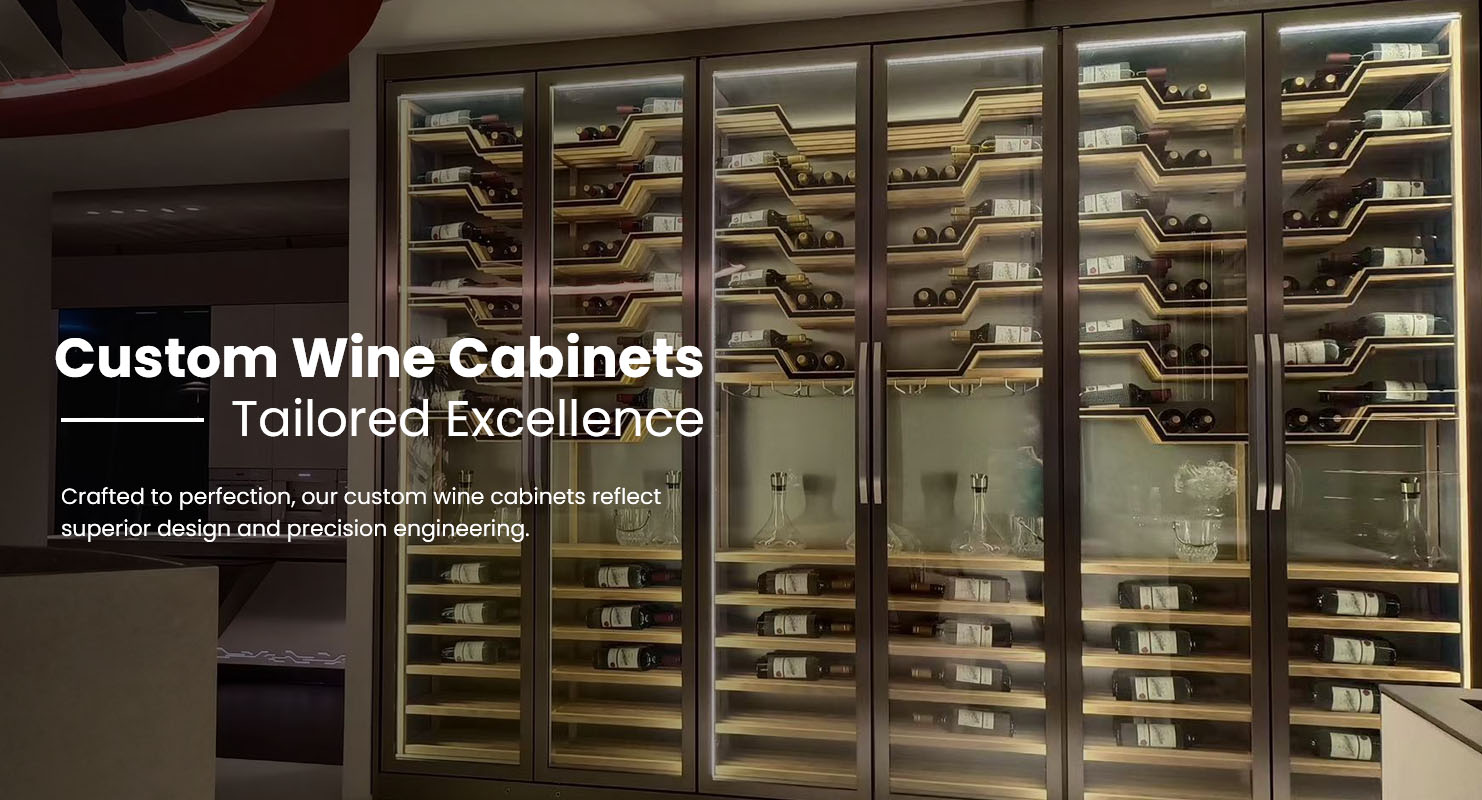What Is A Compressor Wine Cooler
A compressor Wine Cooler is a temperature-controlled appliance that uses a refrigeration compressor system — similar to that in a household refrigerator — to maintain ideal wine storage conditions.
It provides powerful cooling performance, stable temperature control, and long-term durability, making it the most popular choice for serious collectors, restaurants, and hotels.
Unlike thermoelectric models that depend on ambient air, compressor wine coolers work efficiently even in warm or variable climates, offering professional-grade preservation for every bottle.
1. How a Compressor Wine Cooler Works
The system operates based on the vapor compression refrigeration cycle:
Compressor Activation – The compressor compresses refrigerant gas (often R600a or R134a), raising its temperature and pressure.
Condensation – The hot, high-pressure gas moves through condenser coils, releasing heat and becoming a liquid.
Expansion – The liquid refrigerant passes through an expansion valve, reducing pressure and cooling rapidly.
Evaporation – The cold refrigerant absorbs heat inside the cooler, lowering the internal temperature.
Cycle Repeat – The compressor restarts automatically to maintain the preset temperature range.
This continuous cycle ensures precise temperature stability, regardless of surrounding room conditions.
2. Why Compressor Systems Are Ideal for Wine Storage
Compressor wine coolers are engineered to deliver consistent, energy-efficient cooling — an essential factor for wine preservation.
Key advantages include:
Strong Cooling Power – Reaches target temperature quickly, even when ambient temperature exceeds 30 °C.
Stable Temperature – Maintains precise control between 5 °C and 18 °C (41 °F–65 °F).
Humidity Balance – Keeps ideal relative humidity around 50–75 %, protecting corks from drying out.
Long Lifespan – Heavy-duty compressors and copper evaporators offer years of reliable operation.
Large Capacity – Capable of cooling high bottle volumes efficiently (50 L to 500 L+).
WINTON uses Embraco compressors, known for durability, quiet operation, and international energy-efficiency standards.
3. Compressor vs. Thermoelectric Wine Coolers
| Feature | Compressor Wine Cooler | Thermoelectric Wine Cooler |
|---|---|---|
| Cooling Method | Refrigerant compression system | Peltier (thermoelectric) module |
| Performance in Warm Environments | Excellent | Limited |
| Noise Level | Low (≈ 40–42 dB) | Very quiet (≈ 35 dB) |
| Temperature Range | 5 °C–18 °C | 10 °C–18 °C |
| Capacity | Medium to large | Small to medium |
| Energy Use | Slightly higher | Lower |
| Maintenance | Minimal | Minimal |
| Best For | Long-term, professional storage | Short-term, small collections |
For large or commercial installations, compressor coolers offer the reliability and performance needed to keep wine perfectly conditioned year-round.
4. Key Components of a Compressor Wine Cooler
| Component | Function |
|---|---|
| Compressor | Compresses and circulates refrigerant through the system. |
| Condenser Coils | Dissipate heat generated during compression. |
| Expansion Valve / Capillary Tube | Controls refrigerant flow and pressure drop. |
| Evaporator Coils | Absorb heat inside the cabinet to lower temperature. |
| Thermostat / Sensor | Monitors and regulates the internal temperature. |
| Fan System | Circulates cool air evenly across all bottles. |
Each part is carefully balanced to provide uniform cooling, low vibration, and consistent humidity — the core of WINTON’s design philosophy.
5. Temperature Precision and Zone Options
Single-Zone Compressor Wine Coolers
Maintain one uniform temperature — ideal for storing only red or only white wines.
Dual-Zone Compressor Wine Coolers
Feature two independently controlled chambers for storing red and white wines simultaneously.
| Wine Type | Ideal Temperature | Recommended Zone |
|---|---|---|
| Red Wines | 12 °C–18 °C | Upper Zone |
| White Wines | 7 °C–12 °C | Lower Zone |
WINTON’s dual-zone compressor coolers use individual thermostats and fan systems, ensuring temperature consistency within ±1 °C for each section.
6. Energy Efficiency and Eco-Friendly Design
Modern compressor systems have evolved to become quiet and environmentally responsible.
WINTON integrates:
R600a refrigerant, which has zero ozone depletion potential.
Variable-speed compressors that adjust power output according to temperature demand.
Thick insulation and airtight door seals to prevent heat leakage.
Low-power LED lighting that produces minimal heat.
This combination reduces energy use while maintaining premium performance, meeting global energy standards for residential and commercial applications.
7. Advantages of a Compressor Wine Cooler
Superior Cooling Capacity – Ideal for large collections or built-in installations.
Temperature Consistency – Unaffected by room temperature changes.
Quiet and Low-Vibration – WINTON units operate at under 42 dB with vibration-damping components.
Long Service Life – Industrial-grade compressors with durable copper tubing ensure longevity.
Versatile Installation – Suitable for both built-in and freestanding placement.
Whether for home kitchens, restaurants, or wine bars, compressor coolers deliver dependable performance every day.
8. Maintenance and Longevity
To keep your compressor wine cooler performing optimally:
Clean condenser vents every 6 months to ensure proper airflow.
Avoid overfilling shelves, allowing air circulation around bottles.
Check door gaskets for tight seals.
Descale interior humidity trays periodically to prevent residue.
Keep away from direct heat sources like ovens or sunlight.
With routine care, a WINTON compressor cooler can operate smoothly for 10 years or more.
9. Frequently Asked Questions
1. Are compressor wine coolers noisy?
No. High-quality compressors like WINTON’s produce under 42 dB, quieter than normal conversation.
2. Do compressor wine coolers vibrate?
Very little. Rubber-mounted compressors and dampened fans minimize vibration to protect wine sediment.
3. Can I install a compressor wine cooler under a counter?
Yes, provided it’s a front-vented built-in model. WINTON offers both freestanding and built-in versions.
4. Is compressor cooling better than thermoelectric?
For long-term storage, yes. Compressor systems handle large capacities and warmer environments more effectively.
5. Are compressor coolers energy-efficient?
Yes. WINTON’s models use eco-friendly refrigerants and precision thermostats to reduce electricity consumption.
Conclusion
A compressor wine cooler is the most efficient and reliable way to store wine at the correct temperature and humidity, no matter the climate.
Using advanced refrigeration technology, it delivers fast cooling, precise control, and professional stability unmatched by thermoelectric systems.
WINTON Wine Cooler manufactures a complete range of compressor wine cabinets — from compact under-counter units to large dual-zone models — featuring Embraco compressors, copper evaporators, and UV-protected glass doors for superior preservation.
Explore more at www.wintonwinecooler.com — where engineering precision meets the art of fine wine storage.
Previous: What Is A Dual Zone Wine Cooler


